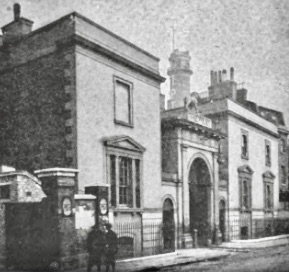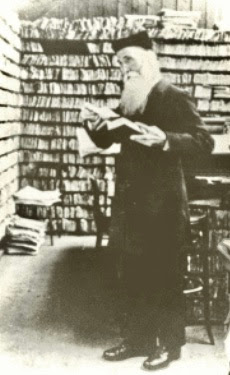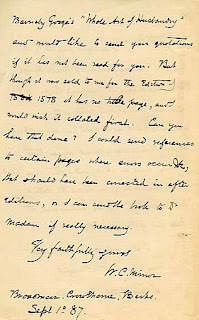By Mary Dodge Allen
He was a U.S. Civil War surgeon who struggled for years with paranoid delusions that led him to commit murder, resulting in his commitment to an asylum for the criminally insane. How did Dr. W. C. Minor become a key contributor to The Oxford English Dictionary?
Early Life, Education and the Civil War:
William Chester Minor was born in June 1834 in Ceylon (now Sri Lanka), the son of Eastman and Lucy Minor, who were Congregational church missionaries from New England. When William was only three years old, his mother died. His father later married another American missionary, and they continued working in Ceylon.
At the age of 14, William left Ceylon and went to live with an uncle in New Haven, Connecticut. After attending Russell Military Academy, he enrolled at Yale University as a medical student. He graduated as a surgeon in 1863 and enlisted in the Union Army. By May 1864, Dr. Minor was posted to Virginia, and he worked as an Army surgeon during the bloody aftermath of the Battle of the Wilderness, where the Union Army suffered over 18,000 casualties.
Struggle with Mental Illness:
After the war ended, the Army promoted Dr. Minor to the rank of captain. But he began showing signs of mental instability. His delusions worsened, and in 1868, Army superiors arranged for his admission St. Elizabeth’s Hospital, a Washington D.C. facility for the insane. He remained there until 1870, when he was discharged from the Army and granted a pension.
Dr. Minor decided to move to London, hoping to start a new life. But his paranoid delusions began tormenting him again.
On February 17, 1872, Dr. Minor shot and killed a man walking toward the Lion Brewery, thinking the man was plotting to kill him.
In reality, the man he murdered, George Merrett, was simply reporting for work as a brewery stoker, to support his pregnant wife, Eliza, and their six children.
Insane Asylum - Books, Books, and More Books:
At his trial, Dr. Minor was found not guilty by reason of insanity and sent to England's Broadmoor Asylum for the Criminally Insane, where he continued receiving his U.S. Army pension.
A remorseful Dr. Minor began sending a portion of his pension to Eliza Merrett, to help support her and her many children.
Dr. Minor also began corresponding with London booksellers. He used his remaining pension funds to purchase scholarly books, mostly from the sixteenth and seventeenth centuries. As his books piled up, the asylum moved him to a room large enough to house them.
Eliza Merrett forgave Dr. Minor. She began visiting him regularly and often brought him books.
It is believed that Eliza gave him a small publication that changed his life; the pamphlet requesting assistance from the public in compiling words and quotations for The Oxford English Dictionary.
The Origin of The Oxford English Dictionary:
The first dictionary of the English language: A Table Alphabetical, by Robert Cawdrey, was published in 1604. Others followed, including one of the most famous dictionaries: A Dictionary of the English Language, by Samuel Johnson, published in 1755. By the mid-1800s, the English language had been expanding and incorporating words and phrases from all over the world. A new, more comprehensive dictionary was needed.
In 1857, members of the London Philological Society began to work on an expanded dictionary that would include not only word definitions but quotations from early English language publications.
Enter: Sir James Augustus Henry Murray, Editor:
The massive project moved slowly and nearly came to a halt, until the Oxford University Press took over in 1879. They selected a prominent Scottish lexicographer, James Murray, to serve as the dictionary’s editor. Murray was the eldest son of a clothier, who became an accomplished self-taught linguist.
A fellow member of the prestigious Council of the Philological Society described Murray as an: “unconventionally attired man in corduroy trousers, with a tie of pink ribbon, having the most strikingly twinkling brown eyes...”
Murray knew he needed help to compile the dictionary, so he launched an “Appeal to the English-speaking and English-reading public,” by distributing pamphlets and placing advertisements in magazines. He asked volunteers to send him “as many quotations as you can for ordinary words” and words that were “rare, obsolete, old-fashioned, new, peculiar or used in a peculiar way.”
In 1881, Dr. William Minor began sending his contributions to Murray. Over the next twenty years, he sent more than 12,000 quotations, mostly sourced from the huge collection of antiquated books he had purchased.
It is said Dr. Minor's devotion to this task helped him to keep his delusions at bay during his waking hours. But at night, they still tormented him. In all, he sent in contributions for over 10,000 words, a feat that amazed James Murray.
They Finally Meet at Broadmoor:
In 1891, Murray arranged to meet Dr. Minor at Broadmoor, to personally thank him for his contributions over the past ten years. James Murray assumed that Dr. Minor was a member of Broadmoor’s medical staff. Imagine Murray’s surprise when he discovered Dr. Minor was actually an inmate who had committed murder.
Mary Dodge Allen is the winner of a Christian Indie Award, an Angel Book Award, and two Royal Palm Literary Awards (Florida Writer's Association). She and her husband live in Central Florida, where she has served as a volunteer with the local police department. Her childhood in Minnesota, land of 10,000 lakes, sparked her lifelong love of the outdoors. She has worked as a Teacher, Counselor and Social Worker. Her quirky sense of humor is energized by a passion for coffee and chocolate. She is a member of the Florida Writer's Association, American Christian Fiction Writers and Faith Hope and Love Christian Writers.











Thank you for posting this wonderful story of God's grace and mercy in the midst of tragedy and adverse circumstances.
ReplyDeleteWhat an amazing story!
ReplyDeleteIt was uplifting for me to learn about Dr. William C Minor's life story. It is truly a story of God's redemption.
ReplyDelete